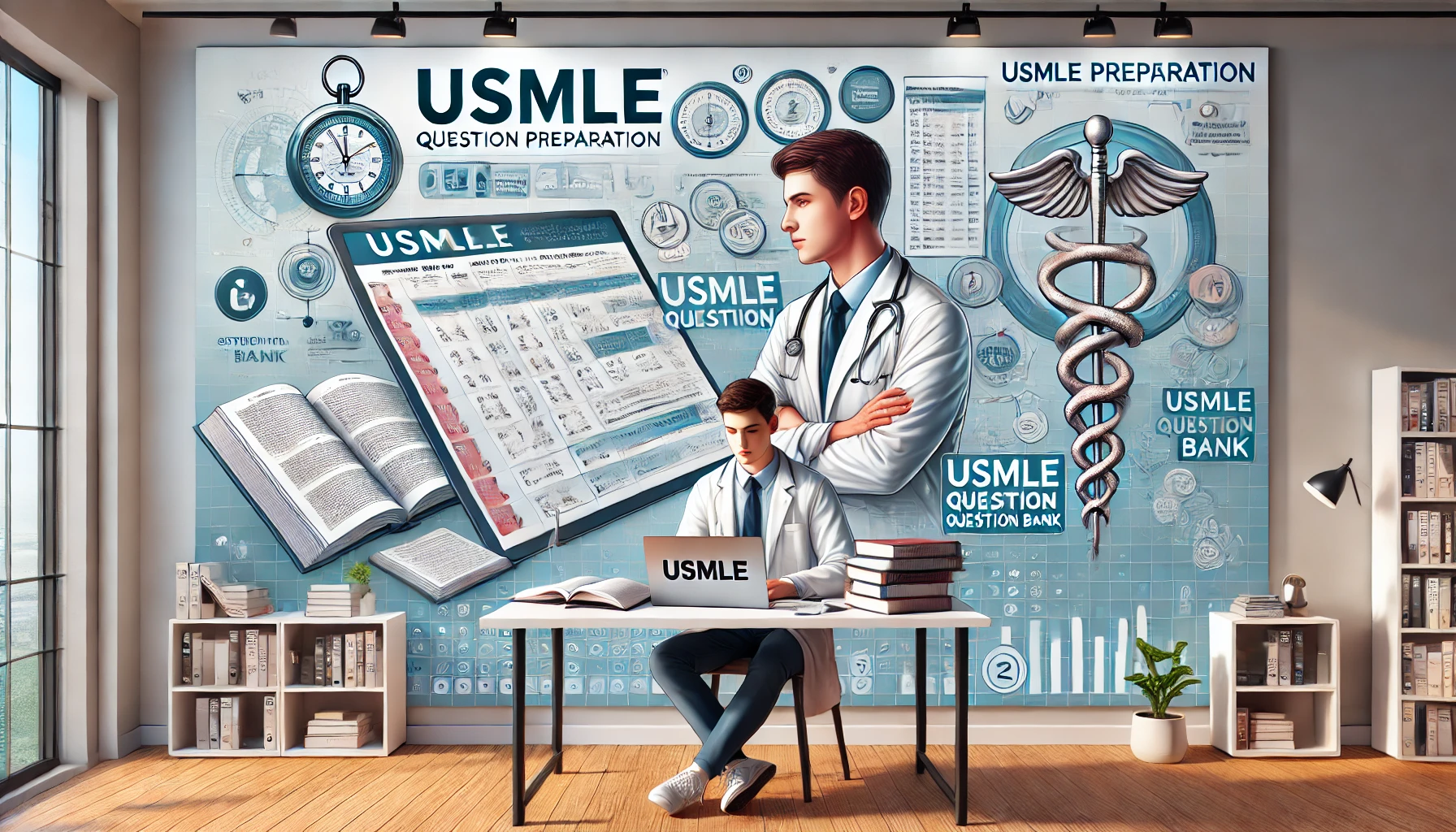USMLE Preparation: Top Study Guides and Prep Books for Every Step
Preparing for the United States Medical Licensing Examination (USMLE) can feel overwhelming, but with the right resources and a solid study plan, you can conquer each step with confidence. Whether you’re starting with the USMLE Step 1, moving on to Step 2 CK, or gearing up for Step 3, having access to the best study guides and prep books is crucial. In this comprehensive guide, we’ll walk you through the top resources for every stage of your USMLE journey, including how to utilize USMLE question banks and practice exams effectively. By the end of this blog, you’ll have a clear roadmap to follow, ensuring you’re well-prepared for success.
Why Choosing the Right USMLE Step 1 Study Guide is Crucial
The USMLE Step 1 is often considered the most challenging and important exam in a medical student’s career. It tests your understanding of basic science concepts and your ability to apply them to medical practice. Choosing the right USMLE Step 1 study guide can make all the difference in how well you perform.
Top USMLE Step 1 Study Guides and Prep Books
When it comes to USMLE Step 1 preparation, several resources stand out due to their comprehensive coverage and high-yield content:
- First Aid for the USMLE Step 1: This guide is often referred to as the “Bible” for Step 1 preparation. Written by students who have excelled in the exam, and reviewed by top faculty, it covers over 1,300 topics, complete with mnemonics, illustrations, and rapid review sections. External Source: First Aid USMLE Guide
- Kaplan USMLE Step 1 Lecture Notes: This seven-book set covers every subject tested on Step 1, from anatomy to physiology, and includes detailed explanations and color diagrams that help bridge the gap between disciplines. It’s particularly useful for building a solid foundation in the basic sciences.
- Pathoma: For mastering pathology, Pathoma’s video lectures and accompanying book are indispensable. Dr. Sattar’s clear explanations and high-yield focus make complex topics easier to understand and retain.
These resources are designed to help you build a strong foundation in basic sciences, making them ideal for the first phase of your USMLE Step 1 preparation.
Best USMLE Prep Books for Step 2 CK: What You Need to Know
After successfully completing Step 1, the next hurdle is the USMLE Step 2 Clinical Knowledge (CK) exam. This exam assesses your ability to apply medical knowledge and clinical science essential for patient care. The right study materials are crucial for covering the broad scope of this exam.
Recommended USMLE Step 2 CK Study Guides
Here are some of the best resources for Step 2 CK preparation:
- Kaplan USMLE Step 2 CK Lecture Notes: This five-book set is updated annually and offers a thorough review of the key topics you’ll encounter on the exam. It covers internal medicine, pediatrics, obstetrics/gynecology, surgery, and psychiatry/epidemiology/patient safety.
- First Aid for the USMLE Step 2 CK: Like its Step 1 counterpart, this guide is written by students and is packed with high-yield information. It’s designed to help you review the critical concepts quickly and efficiently.
- USMLE Step 2 Secrets: This book is well-known for its concise, question-and-answer format, which is great for quick reviews and reinforcing key concepts.
Using these guides will help you navigate the extensive content covered in Step 2 CK, ensuring you’re ready to apply your knowledge in a clinical context.
Utilizing USMLE Question Banks and Practice Exams
No matter which USMLE step you’re preparing for, question banks and practice exams are essential tools for success. They not only help you assess your knowledge but also train you to think like the examiners.
Top USMLE Question Banks
- UWorld: Universally regarded as the gold standard for USMLE preparation, UWorld offers an extensive question bank that mirrors the format and difficulty of the actual exam. Each question comes with detailed explanations, helping you understand why certain answers are correct or incorrect.
- Amboss: This question bank is a strong competitor to UWorld and is known for its challenging questions. It also features a clinical library that can be incredibly useful during your clinical rotations.
- USMLE-Rx: Created by the same team behind First Aid, USMLE-Rx integrates seamlessly with the First Aid guide, offering flashcards, Q-banks, and video resources tailored to the high-yield topics covered in the exam.
Importance of Practice Exams
Practice exams are a critical component of USMLE preparation. They help simulate the actual testing experience and identify areas where you need further review.
- NBME Self-Assessments: The National Board of Medical Examiners offers several practice tests that feature questions from previous USMLE exams. These are invaluable for getting a realistic sense of what to expect on test day.
- UWorld Self-Assessments: These are also highly recommended, as they provide a predicted score and detailed performance analysis, which can guide your final weeks of study.
Crafting a USMLE Study Schedule That Works
Creating a structured study schedule is one of the most effective ways to ensure you’re covering all necessary material without burning out. A good study schedule should balance content review, practice questions, and rest.
Tips for Building Your USMLE Study Schedule
- Start Early: Begin your preparation at least six months before your exam date. This gives you ample time to cover all the material and allows for flexibility if you need to spend extra time on challenging topics.
- Daily Goals: Break down your study sessions into daily goals, focusing on specific subjects or systems. This approach helps prevent feeling overwhelmed by the sheer volume of information.
- Integrate Practice Questions: Incorporate practice questions into your daily study routine. This not only reinforces what you’ve learned but also keeps you engaged and actively applying knowledge.
- Review and Revise: Regularly review previously covered material to reinforce your memory. Using flashcards or spaced repetition software like Anki can be particularly effective.
A well-organized study schedule is key to ensuring you stay on track and adequately prepare for each USMLE step.
The USMLE Registration Process: What to Expect
Before diving into your studies, it’s important to understand the USMLE registration process. Knowing what to expect can help reduce stress and ensure you’re fully prepared for test day.
Step-by-Step Guide to USMLE Registration
- Determine Your Eligibility: Ensure you’re eligible to take the USMLE by reviewing the criteria on the official USMLE website. This varies depending on whether you’re a student or graduate of a medical school in the U.S. or abroad.
- Choose Your Test Date: Select your preferred testing window, keeping in mind your study schedule. It’s important to give yourself enough time to prepare but not so much that you lose momentum.
- Submit Your Application: Register through the appropriate body—either the NBME, FSMB, or ECFMG—depending on your location and medical school status.
- Receive Your Scheduling Permit: Once your application is processed, you’ll receive a scheduling permit via email, which you’ll need to schedule your exam at a Prometric test center.
- Schedule Your Exam: Use the scheduling permit to book your test date and location through Prometric’s website.
For more detailed information on the registration process, check out the USMLE official site.
How to Pass the USMLE: Essential Tips for Success
Passing the USMLE requires more than just studying hard—you need a strategic approach to ensure you’re maximizing your efforts and retaining critical information.
Proven Strategies for Passing the USMLE
- Active Learning: Instead of passively reading or watching lectures, engage with the material through practice questions, flashcards, and teaching others. This reinforces learning and helps you retain information longer.
- Time Management: During the exam, managing your time effectively is crucial. Practice pacing yourself with timed question blocks to get a feel for how long you should spend on each question.
- Stay Healthy: Physical and mental health play a significant role in your ability to study effectively. Ensure you’re getting enough sleep, eating well, and exercising regularly to keep your mind sharp.
- Simulate Exam Conditions: Take full-length practice exams under timed conditions to simulate the test day experience. This helps reduce anxiety and prepares you mentally for the actual exam.
By following these strategies, you can approach the USMLE with confidence, knowing that you’re fully prepared to pass each step.
Your Path to USMLE Success
Preparing for the USMLE is a challenging journey, but with the right resources and a solid plan, you can succeed. Whether you’re starting with the USMLE Step 1 study guide, exploring the best USMLE prep books for Step 2 CK, or navigating the USMLE registration process, each step brings you closer to your goal of becoming a licensed physician.
Remember, practice makes perfect—so utilize question banks, take practice exams, and follow a well-structured study schedule. By incorporating these elements into your preparation, you’ll be well-equipped to pass the USMLE and move forward in your medical career.
For additional resources and personalized study plans, visit Regent Studies, where you can find tools and guidance tailored to help you succeed on your USMLE journey.




